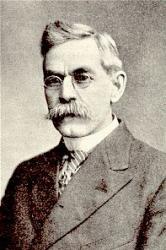1828 - 1900 Person Name: Harriet Parr, 1828— Author of "Hear my prayer, O heavenly Father" in Hymnal and Liturgies of the Moravian Church Pseudonym: Holme Lee
Parr, Harriet, was born at York in 1828, and has published several works under the nom de plume of "Holme Lee," including Maude Talbot, 1854; Sylvan Holt’s Daughter, 1858; Warp and Woof, 1861; Mr. Wynyard's Ward, 1867; and several other works of fiction. Miss Parr is known to hymnology by one hymn only, viz.:—
Hear my [our] prayer, 0 heavenly Father. Evening. This beautiful and pathetic hymn appeared in her story The Wreck of the Golden Mary, which was the Christmas number of Charles Dickens's Household Words, 1856. The way in which the hymn is introduced into the story has been often told, and is worth repeating. The story sets forth how the ship Golden Mary, on her voyage to California, struck on an iceberg, and the passengers, taking to the boats, suffered privations for several days. To beguile the time they repeated stories. One of them, Dick Tarrant, a wild youth, relates some of his experiences, in which he says:—
“What can it be that brings all these old things over my mind? There's a child's hymn I and Tom used to say at my mother's knee, when we were little ones, keeps running through my thoughts. It's the stars, may be; there was a little window by my bed that I used to watch them at, a window in my room at home in Cheshire; and if I were ever afraid, as boys will be after reading a good ghost story, I would keep on saying it till I fell asleep."
”That was a good mother of yours, Dick; could you say that hymn now, do you think ? Some of us might like to hear it."
"It is as clear in my mind at this minute as if my mother was here listening to me," said Dick. And he repeated
" 'Hear my prayer, O Heavenly Father,
Ere we lay us down to sleep,' " &c.
Through the instrumentality of Dr. Allon it was included in the New Congregational Hymn Book, 1859, No. 945, in 5 st. of 4 1. Since then it has reappeared in numerous collections in Great Britain and America. In some hymn-books, as in Thring's Collection, 1882, it begins, "Hear our prayer, O heavenly Father," and a doxology is added. Instead of the doxology, the Rev. W. J. Hall added the following lines (written in 1873).
"Home of rest and peace unending,
Whither turns my longing heart,
Home from whence thro' all the ages
Never more shall I depart."
This addition was given in the New Mitre Hymnal, 1875. In the Parish Hymn Book, 1863 and 1875, it is a Morning hymn, and begins:—
"Praise to Thee, Whose hosts have watched us
Through the helpless hours of sleep," &c.
-- John Julian, Dictionary of Hymnology (1907)
Harriet Parr


 My Starred Hymns
My Starred Hymns








